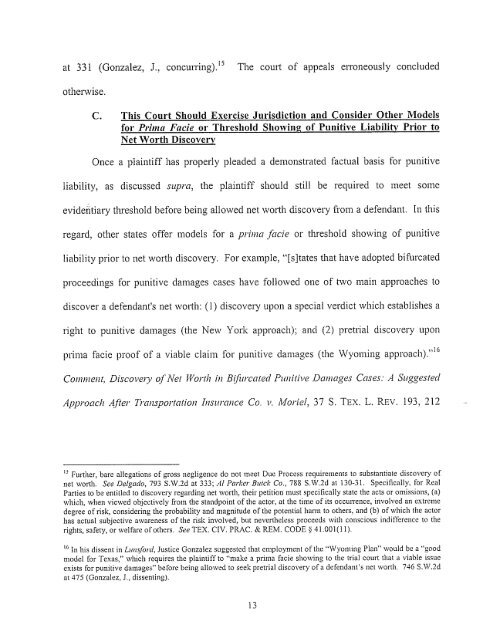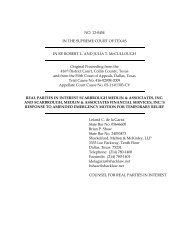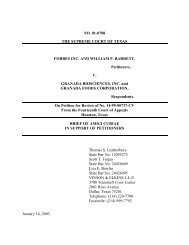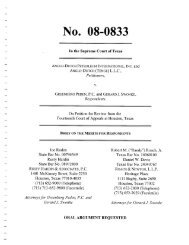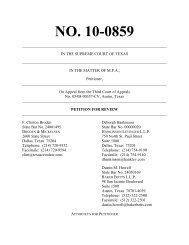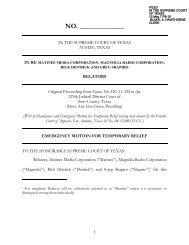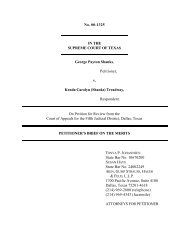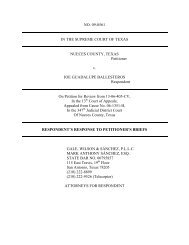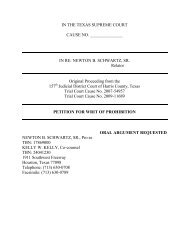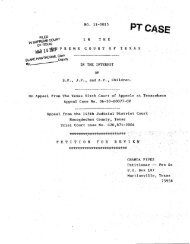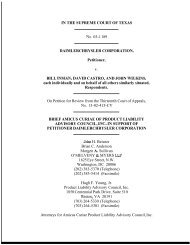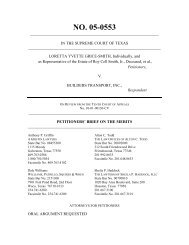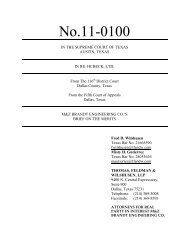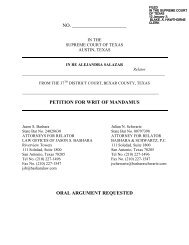Petition for Writ of Mandamus - Filed - Supreme Court of Texas
Petition for Writ of Mandamus - Filed - Supreme Court of Texas
Petition for Writ of Mandamus - Filed - Supreme Court of Texas
Create successful ePaper yourself
Turn your PDF publications into a flip-book with our unique Google optimized e-Paper software.
at 331 (Gonzalez, J., concurTing) . t'<br />
The court <strong>of</strong> appeals erroneously concluded<br />
otherwise .<br />
C .<br />
This <strong>Court</strong> Should Exercise Jurisdiction and Consider Other Model s<br />
<strong>for</strong>PrnaFacieor Threshold Showing <strong>of</strong> Punitive Liability Prior t o<br />
Net Worth Discover y<br />
Once a plaintiff has properly pleaded a demonstrated factual basis <strong>for</strong> punitiv e<br />
liability, as discussed supra, the plaintiff should still be required to meet som e<br />
evidentiary threshold be<strong>for</strong>e being allowed net worth discovery from a defendant . In this<br />
regard, other states <strong>of</strong>fer models <strong>for</strong> a prima facie or threshold showing <strong>of</strong> punitiv e<br />
liability prior to net worth discovery . For example, "[s]tates that have adopted bifurcate d<br />
proceedings <strong>for</strong> punitive damages cases have followed one <strong>of</strong> two main approaches to<br />
discover a defendant's net worth : (1) discovery upon a special verdict which establishes a<br />
right to punitive damages (the New York approach) ; and (2) pretrial discovery upo n<br />
prima facie pro<strong>of</strong> <strong>of</strong> a viable claim <strong>for</strong> punitive damages (the Wyoming approach) ." 1 6<br />
Comment, Discovery <strong>of</strong> Net Worth in Bifurcated Punitive Damages Cases : A Suggested<br />
Approach After Transportation Insurance Co . v. I1VIoriel, 37 S . TEX. L. REV, 193, 21 2<br />
Further, bare allegations <strong>of</strong> gross negligence do not meet Due Process requirements to substantiate discovery o f<br />
net worth . See Delgado, 793 S.W.2d at 333 ; Al Parker Buick Co ., 788 S.W.2d at 130-31 . Specifically, <strong>for</strong> Rea l<br />
Parties to be entitled to discovery regarding net worth, their petition must specifically state the acts or omissions, (a )<br />
which, when viewed objectively from the standpoint <strong>of</strong> the actor, at the time <strong>of</strong> its occurrence, involved an extreme<br />
degree <strong>of</strong> risk, considering the probability and magnitude <strong>of</strong> the potential harm to others, and (b) <strong>of</strong> which the actor<br />
has actual subjective awareness <strong>of</strong> the risk involved, but nevertheless proceeds with conscious indifference to th e<br />
rights, safety, or welfare <strong>of</strong> others . See TEX. CIV. PRAC. & REM . CODE § 41 .001(11) .<br />
!U In his dissent in Lims<strong>for</strong>d, Justice Gonzalez suggested that employment <strong>of</strong> the "Wyoming Plan" would be a "goo d<br />
model <strong>for</strong> <strong>Texas</strong>," which requires the plaintiff to "make a prima facie showing to the trial court that a viable issu e<br />
exists <strong>for</strong> punitive damages" be<strong>for</strong>e being allowed to seek pretrial discovery <strong>of</strong> a defendant's net worth . 746 S .W .2 d<br />
at 475 (Gonzalez, J., dissenting) .<br />
13


